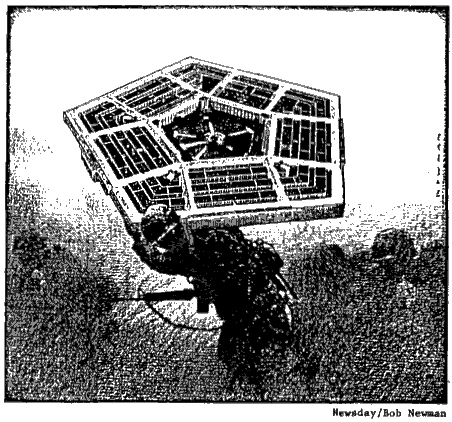

THE SPIT-SHINE SYNDROME
Organizational Irrationality In the American Field Army
by Christopher Bassford, with a Foreword by Lt. Gen. Robert M. Elton
(Westport, CT, Greenwood Press, 1988), 168 pages, index.
ISBN-10: 0313262152 — ISBN-13: 978-0313262159
Hits relentlessly at bureaucratic systems, yet does not degrade the officers and soldiers who could, under modernized, thoroughly streamlined conditions, operate to their full potential. Contrary to other critics, the author has provided thoughtful solutions.
From the Foreword by Lieutenant General Robert Elton
Bassford's comprehensive proposals put him in an altogether different category from other self-proclaimed "defense reformers."
Chicago Tribune correspondent David Evans
This literate and thoughtful work should not only be required reading at the war colleges and other military education institutions, but offered in a gilt-edged version to Secretary of Defense Richard Cheney as a manual for Army reform.
Combat Arms International
A useful addition to a serious discussion on where we need to go as an Army. There are real philosophical issues that the profession needs to address, but has been reluctant to do so to this point, short of using a Band-Aid approach.
Military Review
Stands out from any other work on the subject because of the author's proposed solutions.... Bassford's ingenious solution to the unit evaluation problem deserves careful study.
Marine Corps Gazette
The problem of adapting American military organization to new social, political, and strategic realities has perplexed military thinkers since at least the closing days of World War II; since the Vietnam debacle, proposals for reform have proliferated. Practical solutions, however, have proven elusive. In this volume, the author examines the various existing approaches to reform and concludes that most reform prescriptions are either unworkable or irrelevant—if not actually counter-productive—to the cause of improving the effectiveness of American combat forces. Rejecting suggestions that perennial American military failure can be traced to the inadequacies of military personnel or of American society in general, this book argues that neither a return to the draft, imposition of an ethical code for military leaders, nor creation of a General Staff will address fundamental issues. Likewise, it argues that structural reform, while needed, can strike only at symptoms, not causes. It is the author's view that the roots of American military ineptitude lie in the military services' organizational methods, not their organizational structure. These methods are the natural product of the unique evolution of American military institutions, but they are incompatible with the structure, role, and doctrine of the armed forces as they exist today. The reform prescription offered here is, on the one hand, to recognize that the existence of large, standing field forces, which is a new feature in American history, requires that the field army gain a greater measure of institutional independence from the military bureaucracy. On the other hand, it is necessary to make collective unit effectiveness—currently irrelevant to individual careers—serve as the "bottom line" basis for all assignment and promotion decisions within the field army. The necessary changes in personnel policies and evaluation methods are discussed in detail. The book argues that this approach will, if properly implemented, turn the field forces into the driving engine for reform throughout the entire defense establishment, thus removing the esoteric problems of weapons procurement and command arrangements from the desks of overwhelmed civilian policy makers while simultaneously strengthening real civilian control over the military. Combining the most promising of extant reform proposals, current programs, and some genuinely new conceptions, the book aims to revitalize the currently moribund debate on military reform.
Christopher Bassford received his M.A. from Ohio University in 1981, and served from 1981 to 1986 as a field artillery officer with tours in both Korea and Germany. At the time of publication, he was completing his Ph.D in modern European history at Purdue University. His current resumé, CV, and bio can be found here.
 "The best description of the Army's problems I have read. Bassford's critique is as valid now, after the fall of the Berlin Wall and the Soviet Union, the military drawdown, the Gulf War and the radical shift in missions, as it was in the last year of the Reagan presidency. This validates his assertion that the Army's problems are systemic, rather than personal or situational. His examples will ring true to anyone who has worn the uniform for more than a week. His prescriptions for change are bold and insightful. I'm not sure they would all work, but they all merit discussion and consideration. This book is as important and valid today as the day it was published. It should be required reading for any officer candidate." CPT James Vizzard, Fort Collins, CO.
"The best description of the Army's problems I have read. Bassford's critique is as valid now, after the fall of the Berlin Wall and the Soviet Union, the military drawdown, the Gulf War and the radical shift in missions, as it was in the last year of the Reagan presidency. This validates his assertion that the Army's problems are systemic, rather than personal or situational. His examples will ring true to anyone who has worn the uniform for more than a week. His prescriptions for change are bold and insightful. I'm not sure they would all work, but they all merit discussion and consideration. This book is as important and valid today as the day it was published. It should be required reading for any officer candidate." CPT James Vizzard, Fort Collins, CO.
